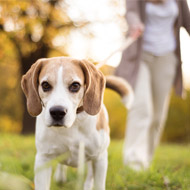Why some dogs are walked more often - study

Motivating factors were a belief that it keeps the dog healthy, a strong relationship with or attachment to the dog and a feeling that the dog enjoys walks.
A new study has shed light on why some dog owners feel more motivated to walk their dogs than others.
Researchers from the University of Liverpool and the University of Western Australia explored the demographics and behavioural factors that give owners a strong sense of encouragement and motivation from their dog - which was referred to as 'the Lassie effect'.
Looking at data from 629 dog owners in the 10-year RESIDE study, researchers analysed the results of two survey outcomes - dog encouragement ('how often my dog encouraged me to go walking in the last month') and dog motivation ('having a dog makes me walk more').
Owners with large dogs were found to be more motivated to walk them. Other motivating factors were a belief that it keeps the dog healthy, a strong relationship with or attachment to the dog and a feeling that the dog enjoys walks.
Owners were less motivated to walk their dog if they perceived them to be too old or sick, or if other family members usually walked the dog.
Researchers say the findings could help to inform future interventions to increase physical activity in people and pets.
The full study has been published in BMC Public Health: http://bmcpublichealth.biomedcentral.com/articles/10.1186/s12889-016-3660-2



 The latest
The latest